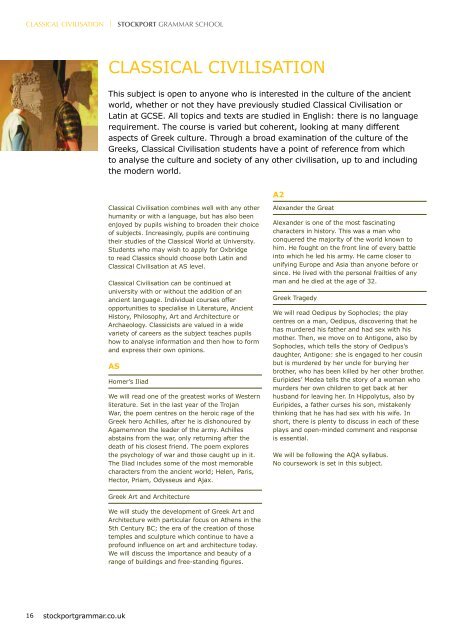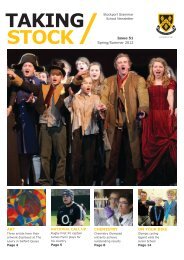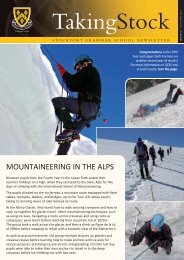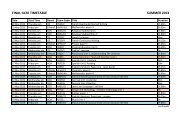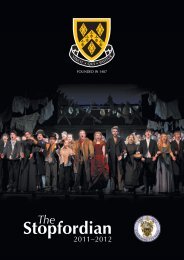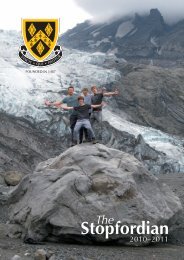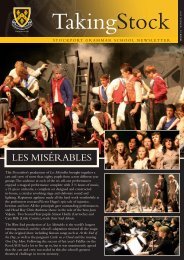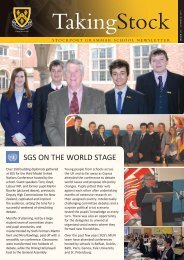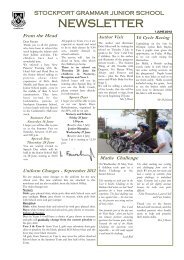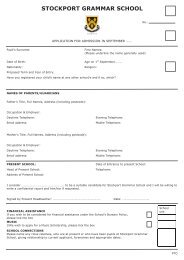Download the prospectus (pdf) - Stockport Grammar School
Download the prospectus (pdf) - Stockport Grammar School
Download the prospectus (pdf) - Stockport Grammar School
You also want an ePaper? Increase the reach of your titles
YUMPU automatically turns print PDFs into web optimized ePapers that Google loves.
CLASSICAL CIVILISATION | STOCKPORT GRAMMAR SCHOOL<br />
STOCKPORT GRAMMAR SCHOOL | DESIGN AND TECHNOLOGY<br />
CLASSICAL CIVILISATION<br />
This subject is open to anyone who is interested in <strong>the</strong> culture of <strong>the</strong> ancient<br />
world, whe<strong>the</strong>r or not <strong>the</strong>y have previously studied Classical Civilisation or<br />
Latin at GCSE. All topics and texts are studied in English: <strong>the</strong>re is no language<br />
requirement. The course is varied but coherent, looking at many different<br />
aspects of Greek culture. Through a broad examination of <strong>the</strong> culture of <strong>the</strong><br />
Greeks, Classical Civilisation students have a point of reference from which<br />
to analyse <strong>the</strong> culture and society of any o<strong>the</strong>r civilisation, up to and including<br />
<strong>the</strong> modern world.<br />
Classical Civilisation combines well with any o<strong>the</strong>r<br />
humanity or with a language, but has also been<br />
enjoyed by pupils wishing to broaden <strong>the</strong>ir choice<br />
of subjects. Increasingly, pupils are continuing<br />
<strong>the</strong>ir studies of <strong>the</strong> Classical World at University.<br />
Students who may wish to apply for Oxbridge<br />
to read Classics should choose both Latin and<br />
Classical Civilisation at AS level.<br />
Classical Civilisation can be continued at<br />
university with or without <strong>the</strong> addition of an<br />
ancient language. Individual courses offer<br />
opportunities to specialise in Literature, Ancient<br />
History, Philosophy, Art and Architecture or<br />
Archaeology. Classicists are valued in a wide<br />
variety of careers as <strong>the</strong> subject teaches pupils<br />
how to analyse information and <strong>the</strong>n how to form<br />
and express <strong>the</strong>ir own opinions.<br />
AS<br />
Homer’s Iliad<br />
We will read one of <strong>the</strong> greatest works of Western<br />
literature. Set in <strong>the</strong> last year of <strong>the</strong> Trojan<br />
War, <strong>the</strong> poem centres on <strong>the</strong> heroic rage of <strong>the</strong><br />
Greek hero Achilles, after he is dishonoured by<br />
Agamemnon <strong>the</strong> leader of <strong>the</strong> army. Achilles<br />
abstains from <strong>the</strong> war, only returning after <strong>the</strong><br />
death of his closest friend. The poem explores<br />
<strong>the</strong> psychology of war and those caught up in it.<br />
The Iliad includes some of <strong>the</strong> most memorable<br />
characters from <strong>the</strong> ancient world; Helen, Paris,<br />
Hector, Priam, Odysseus and Ajax.<br />
Greek Art and Architecture<br />
We will study <strong>the</strong> development of Greek Art and<br />
Architecture with particular focus on A<strong>the</strong>ns in <strong>the</strong><br />
5th Century BC; <strong>the</strong> era of <strong>the</strong> creation of those<br />
temples and sculpture which continue to have a<br />
profound influence on art and architecture today.<br />
We will discuss <strong>the</strong> importance and beauty of a<br />
range of buildings and free-standing figures.<br />
A2<br />
Alexander <strong>the</strong> Great<br />
Alexander is one of <strong>the</strong> most fascinating<br />
characters in history. This was a man who<br />
conquered <strong>the</strong> majority of <strong>the</strong> world known to<br />
him. He fought on <strong>the</strong> front line of every battle<br />
into which he led his army. He came closer to<br />
unifying Europe and Asia than anyone before or<br />
since. He lived with <strong>the</strong> personal frailties of any<br />
man and he died at <strong>the</strong> age of 32.<br />
Greek Tragedy<br />
We will read Oedipus by Sophocles; <strong>the</strong> play<br />
centres on a man, Oedipus, discovering that he<br />
has murdered his fa<strong>the</strong>r and had sex with his<br />
mo<strong>the</strong>r. Then, we move on to Antigone, also by<br />
Sophocles, which tells <strong>the</strong> story of Oedipus’s<br />
daughter, Antigone: she is engaged to her cousin<br />
but is murdered by her uncle for burying her<br />
bro<strong>the</strong>r, who has been killed by her o<strong>the</strong>r bro<strong>the</strong>r.<br />
Euripides’ Medea tells <strong>the</strong> story of a woman who<br />
murders her own children to get back at her<br />
husband for leaving her. In Hippolytus, also by<br />
Euripides, a fa<strong>the</strong>r curses his son, mistakenly<br />
thinking that he has had sex with his wife. In<br />
short, <strong>the</strong>re is plenty to discuss in each of <strong>the</strong>se<br />
plays and open-minded comment and response<br />
is essential.<br />
We will be following <strong>the</strong> AQA syllabus.<br />
No coursework is set in this subject.<br />
DESIGN AND TECHNOLOGY –<br />
PRODUCT DESIGN<br />
The Department offers AQA Product Design (3D Design). This course offers a<br />
considerable breadth of experience for pupils who have studied Product Design,<br />
Resistant Materials or Graphic Products at GCSE. The course provides wide<br />
ranging opportunities from creative design to aspects of manufacturing, industrial<br />
and commercial practice. It allows <strong>the</strong>m to continue <strong>the</strong>ir studies to Advanced<br />
Level, possibly leading to <strong>the</strong> study of a variety of courses at university such as<br />
Engineering, Industrial Design, Graphic Design or Architecture.<br />
Graphics is an integral part of any Design and<br />
Technology course. In Product Design it is<br />
important that pupils communicate <strong>the</strong>ir thinking<br />
clearly and represent <strong>the</strong>ir ideas graphically.<br />
This section can however be expanded to provide<br />
opportunities for more graphically orientated<br />
coursework but it must be noted that all project<br />
work requires a three dimensional outcome.<br />
AS<br />
Unit 1: Materials, Components and Application<br />
Unit 1 is assessed by a written examination worth<br />
50% of <strong>the</strong> total AS marks. The content has been<br />
divided into three sections:<br />
• Materials and Components: this involves<br />
<strong>the</strong> pupils studying a variety of materials to<br />
understand <strong>the</strong> working characteristics, physical<br />
properties, cost and availability that influence<br />
<strong>the</strong> choice of materials in design situations.<br />
• Design and Market influences: pupils will<br />
undertake a detailed analysis of a wide range<br />
of products, leading to knowledge of <strong>the</strong><br />
broader perspectives of <strong>the</strong> designed world<br />
such as <strong>the</strong> environmental sustainability of<br />
products and <strong>the</strong>ir manufacture, ergonomics<br />
and anthropometrics, inclusive design and<br />
consumer safety.<br />
• Processes and Manufacture: pupils<br />
will develop a broad knowledge of <strong>the</strong><br />
manufacturing systems used to make and finish<br />
materials used in <strong>the</strong> production of commercial<br />
products. They will carry out a critical appraisal<br />
of specified products, bringing an understanding<br />
of how materials and components are utilised<br />
to become a manufactured item. Pupils will be<br />
encouraged to explore practical applications<br />
of processing methods as appropriate to <strong>the</strong><br />
products <strong>the</strong>y design and make.<br />
Unit 2: Learning Through Designing and Making<br />
Subject content is applied to <strong>the</strong> design and<br />
manufacture of <strong>the</strong> pupil’s own projects.<br />
This unit is worth 50% of <strong>the</strong> total marks, is<br />
assessed within <strong>the</strong> department and is externally<br />
moderated.<br />
A2<br />
Unit 3: Design and Manufacture<br />
Includes a greater emphasis on industrial practice.<br />
Assessed by a written examination worth 50%<br />
of <strong>the</strong> total A2 marks. The examination has two<br />
sections with three questions in each. Pupils<br />
are required to answer one question from each<br />
section and ano<strong>the</strong>r question from ei<strong>the</strong>r section.<br />
• Materials and Components: pupils will look<br />
at <strong>the</strong> evolution, selection and application<br />
of materials for <strong>the</strong> manufacture of modern<br />
products including how <strong>the</strong> use and conservation<br />
of energy and raw materials affect <strong>the</strong> selection<br />
and application of materials for <strong>the</strong> production<br />
and function of products. Also covered is <strong>the</strong><br />
application of materials and components to suit<br />
specific production processes, from one-off to<br />
mass-production.<br />
• Design and Market influences: this work<br />
includes <strong>the</strong> study of major developments in<br />
technology, a study of manufactured products<br />
and systems, product life cycle, <strong>the</strong> influence of<br />
design and technology in society, <strong>the</strong> marketing<br />
function, safety legislation and quality control.<br />
• Processes and Manufacture: ICT applications,<br />
manufacturing systems, product development<br />
and improvement, safety, systems and control.<br />
Unit 4: Design and Making Practice<br />
This is ano<strong>the</strong>r design and make unit where<br />
knowledge of <strong>the</strong> A2 subject content is applied<br />
to <strong>the</strong> design and making of pupils’ own<br />
projects. This unit is worth 50% of <strong>the</strong> total<br />
marks, is assessed within <strong>the</strong> department and<br />
is externally moderated.<br />
16 stockportgrammar.co.uk stockportgrammar.co.uk 17


